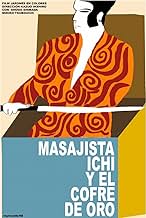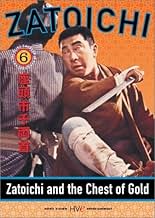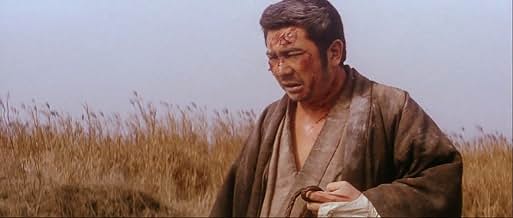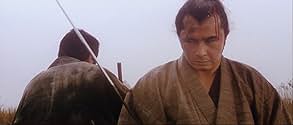NOTE IMDb
7,3/10
2 k
MA NOTE
Ajouter une intrigue dans votre langueZatoichi is mistaken for a thief. To clear his name he must find and defeat the real villain.Zatoichi is mistaken for a thief. To clear his name he must find and defeat the real villain.Zatoichi is mistaken for a thief. To clear his name he must find and defeat the real villain.
- Réalisation
- Scénario
- Casting principal
Tomisaburô Wakayama
- Jûshirô
- (as Jo Kenzaburo)
Kenjirô Uemura
- Gundayu Matsui
- (non crédité)
Avis à la une
I had low expectations for this film but have to say it was a pleasant surprise. The story had humor, visually it was very interesting, and at times beautiful. The lead actor is very good and I'd like to see more of his work.
This film sure started off well. Instead of the usual credits, these were the coolest ones yet. Against a black background, Zatôichi smokes a cigarette as periodically evil men attack him and he dispatches them like flies--and continues smoking like he's the toughest guy in town!
When the film itself begins, Zatôichi comes upon a humble village where they are having a celebration. It seems that after three years of drought, the villagers had a good harvest and can finally pay off the tax bill. However, when the money is stolen, the villagers stupidly believe the stranger in town (Zatôichi) did it. Considering that he's blind and doesn't leave after the theft, it sure seems ridiculous to blame him. Further, after the townsfolk beat him up, it's also very surprising that our hero would agree to help them find their stolen funds.
Zatôichi assumes boss Chuji is behind the theft and makes his way towards his village. On the way, he meets a beautiful but mysterious lady. He doesn't seem to think much of this meeting, but oddly you later see this lady begging the local bosses to have Zatôichi killed. But why?!
When Zatôichi finally meets up with Chuji, his assumption is proved wrong, though it IS true that some of his men were involved in the theft. Zatôichi swears to continue following the trail to the money AND also now agrees to transport a little boy for Chuji to another town. Oh, that Ichi--always helping others and not thinking one bit about himself!
A bit later, most of Chuji's men are killed and he barely escapes. It seems that Monji (another boss) is NOT Chuji's friend after all and he's in league with Jushiro. At this point, if you are feeling a bit confused, don't worry. Though you may not be able to determine who exactly is who, just rest assured that Zatôichi will be administering a well-earned butt kicking!!
Overall, this is a very good addition to the series. While it lacks some of the heart and back story of the best films in the series, the plot was engaging and different. Well worth seeing.
When the film itself begins, Zatôichi comes upon a humble village where they are having a celebration. It seems that after three years of drought, the villagers had a good harvest and can finally pay off the tax bill. However, when the money is stolen, the villagers stupidly believe the stranger in town (Zatôichi) did it. Considering that he's blind and doesn't leave after the theft, it sure seems ridiculous to blame him. Further, after the townsfolk beat him up, it's also very surprising that our hero would agree to help them find their stolen funds.
Zatôichi assumes boss Chuji is behind the theft and makes his way towards his village. On the way, he meets a beautiful but mysterious lady. He doesn't seem to think much of this meeting, but oddly you later see this lady begging the local bosses to have Zatôichi killed. But why?!
When Zatôichi finally meets up with Chuji, his assumption is proved wrong, though it IS true that some of his men were involved in the theft. Zatôichi swears to continue following the trail to the money AND also now agrees to transport a little boy for Chuji to another town. Oh, that Ichi--always helping others and not thinking one bit about himself!
A bit later, most of Chuji's men are killed and he barely escapes. It seems that Monji (another boss) is NOT Chuji's friend after all and he's in league with Jushiro. At this point, if you are feeling a bit confused, don't worry. Though you may not be able to determine who exactly is who, just rest assured that Zatôichi will be administering a well-earned butt kicking!!
Overall, this is a very good addition to the series. While it lacks some of the heart and back story of the best films in the series, the plot was engaging and different. Well worth seeing.
10inframan
I think this stunning film ranks among the great action films of all time but could be hung as stills in any art museum. Hokusai & Hiroshige influences abound.
Yet best of all is the unforgettable character Zatoichi himself. Shintaro Katsu created an everyman/superhero who had no equal, at least in western culture. A squat, homely, bandy-legged self-deprecating blind man full of humor & humility & an abundance of spirituality. And could he make that sword dance.
These movies have no equal. Each one is as perfectly made as any movie can be. I used to go see them when they first appeared in the theaters of San Francisco & Los Angeles Japanese neighborhoods. I still love them every bit as much now.
Yet best of all is the unforgettable character Zatoichi himself. Shintaro Katsu created an everyman/superhero who had no equal, at least in western culture. A squat, homely, bandy-legged self-deprecating blind man full of humor & humility & an abundance of spirituality. And could he make that sword dance.
These movies have no equal. Each one is as perfectly made as any movie can be. I used to go see them when they first appeared in the theaters of San Francisco & Los Angeles Japanese neighborhoods. I still love them every bit as much now.
The Zatoichi series really took off with this entry. Shintaro Katsu is, of course, outstanding in his role as the blind swordsman/masseur. What sets this one aside from the earlier entries in the series, though, is the kinetic camerawork of Kazuo Miyagawa. Utilising every inch of his Panavision frame, Miyagawa set new standards for the samurai genre, choreographing outstanding fight sequences and adding the element of gore to the recipe. For those who think widescreen mayhem began with The Wild Bunch, this is essential viewing!
The following review is an extract from the book "Shintaro Katsu´s Zatoichi: Complete guide to all movies", which is now available on Amazon.
"This is the sixth part of a saga of films shot in the 1960s about the adventures of the blind swordsman Zatoichi. Always motivated by deep convictions and a strong sense of honour, on this occasion Ichi must shed light on the robbery committed against humble peasants in order to prove that he had nothing to do with the crime. Two intriguing women, the clever Ogin and the young Chiyo (sister of the warrior who killed Zatoichi the previous year) will try to prevent the blind masseur from fulfilling his laudable purpose.
(...) In "The chest of gold" we have the rare privilege of seeing in the same film the two masters of the chanbara genre: On the one hand Shintaro Katsu as the heroic Zatoichi and on the other his brother Tomisaburo Wakayama (Ogami Itto en Kozure Okami / "Lone Wolf and Cub") as his antagonist the evil ronin Joshiro. Just as in "Zatoichi's Pilgrimage" (also directed by Kazuo Ikehiro) his opponent Tohachi (Isao Yamagata) has as particularity his skill with kyudo (archery), here Joshiro stands out in the use of another weapon or combative technique: the whip."
"This is the sixth part of a saga of films shot in the 1960s about the adventures of the blind swordsman Zatoichi. Always motivated by deep convictions and a strong sense of honour, on this occasion Ichi must shed light on the robbery committed against humble peasants in order to prove that he had nothing to do with the crime. Two intriguing women, the clever Ogin and the young Chiyo (sister of the warrior who killed Zatoichi the previous year) will try to prevent the blind masseur from fulfilling his laudable purpose.
(...) In "The chest of gold" we have the rare privilege of seeing in the same film the two masters of the chanbara genre: On the one hand Shintaro Katsu as the heroic Zatoichi and on the other his brother Tomisaburo Wakayama (Ogami Itto en Kozure Okami / "Lone Wolf and Cub") as his antagonist the evil ronin Joshiro. Just as in "Zatoichi's Pilgrimage" (also directed by Kazuo Ikehiro) his opponent Tohachi (Isao Yamagata) has as particularity his skill with kyudo (archery), here Joshiro stands out in the use of another weapon or combative technique: the whip."
Le saviez-vous
- AnecdotesJushiro is played by Shintarô Katsu's real-life brother, Tomisaburô Wakayama, who would later star in the Lone Wolf and Cub series of films (produced by Katsu).
- ConnexionsFeatured in Best in Action: 1964 (2020)
Meilleurs choix
Connectez-vous pour évaluer et suivre la liste de favoris afin de recevoir des recommandations personnalisées
- How long is Zatoichi and the Chest of Gold?Alimenté par Alexa
Détails
- Date de sortie
- Pays d’origine
- Langue
- Aussi connu sous le nom de
- La légende de Zato Ichi
- Société de production
- Voir plus de crédits d'entreprise sur IMDbPro
- Durée
- 1h 23min(83 min)
- Rapport de forme
- 2.35 : 1
Contribuer à cette page
Suggérer une modification ou ajouter du contenu manquant





























